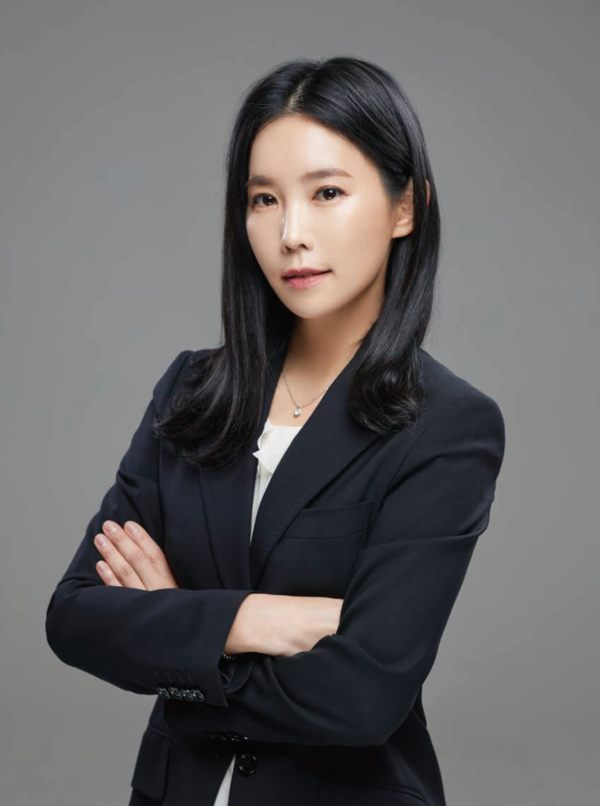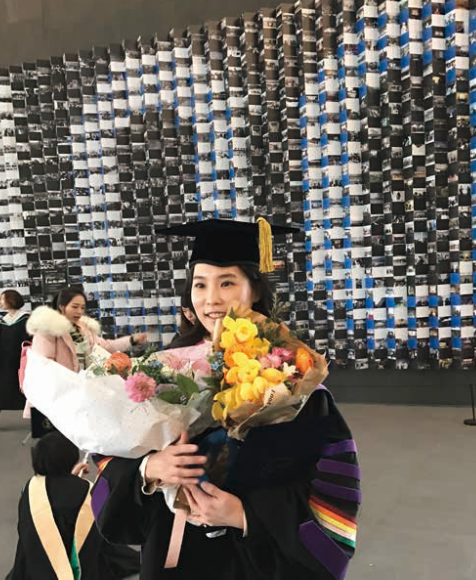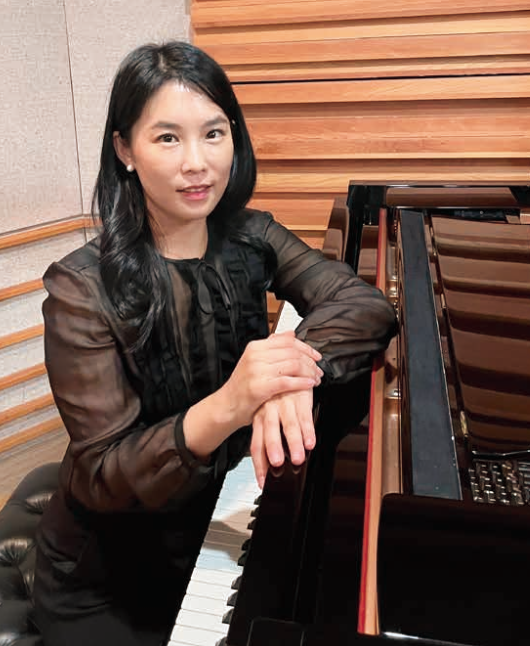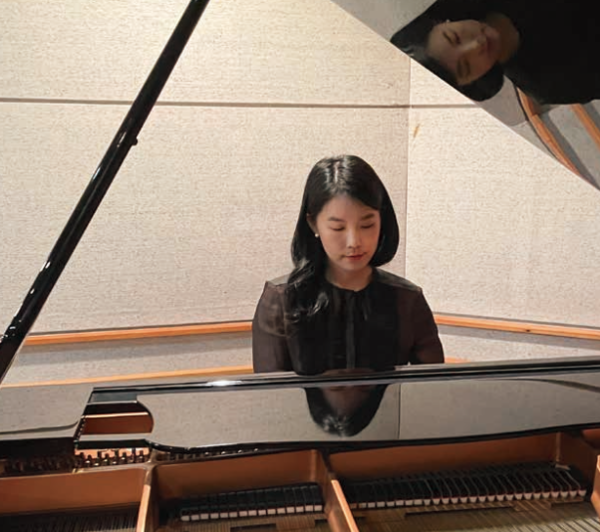
Have you ever taken the famous liberal arts lecture "Music Appreciation" at Da Vinci College of General Education? This class is conducted by Professor Choi Suvin, a graduate of the Department of Piano at Chung-Ang University. This class received a lot of positive reviews that the professor vividly captured the stories of interviews with various musicians, information about classical music, and how to distinguish good instruments on camera and delivered them to students. After graduating from the Department of Piano at Chung-Ang University, she chose cultural administration to complete a master's course and later took charge of performance planning and directing at the National Gugak Center. In addition, Professor Choi is conducting a number of studies through medicine on the theme of the therapeutic effect of music and healing the world with music. Let's meet Professor Choi Suvin with CAH, who plans a fun class that contains various musical knowledge every semester for students at Chung-Ang University.
1. Please introduce yourself to students at Chung-Ang University and readers who will read this article.
I am Choi Suvin, who enjoys listening to music and tries to adapt to the new environment.
2. What made you get into the Department of Piano at Chung-Ang University?
The teacher who taught me piano lessons was at Chung-Ang University, so I naturally had a positive image of Chung-Ang University. Thus, I went on to enter the Department of Piano at Chung-Ang University.
3. Majoring in the piano is likely to take up a big part of the battle with yourself. Did you have difficulties while developing your skills? How did you overcome it?
I think it's tough to major in piano. Majoring in music does not mean self-satisfaction alone, but it is a promise because someone will listen to my music. Once I feel I'm not good enough, I make more mistakes during practical tests, performance classes, and external performances. So I tried hard not to think that I was lacking. Whenever I practiced, I always thought if this was not enough or if I did my best. As much as I spent time, I felt that the results came out. I tried to concentrate and try. Mind control was important. I overcame it by doing this during 40 minutes of practice and 10 minutes of break time.

4. Do you have any memorable club activities or episodes while attending Chung-Ang University?
I joined the calligraphy club. On the first day of joining the club, I joked about the entrance exam for the department of piano, but all my seniors took it seriously. So I remember not being able to go to the club because I was embarrassed after that.
5. After graduating from Chung-Ang University, you worked at the National Gugak Center. I think there is a slight difference between the Department of Piano and the National Gugak Center. Is there a reason why you started working at the National Gugak Center?
The National Gugak Center and the Seoul Arts Center are geographically attached. At first, I wanted to get a job at the Seoul Arts Center, so I met the person in charge separately and actively participated. However, the Seoul Arts Center said it would not recruit employees. At the same time, when I was worried about this, I started working at the National Gugak Center because Seoul Arts Centersaid that they were recruiting employees at the National Gugak Center. Although the opportunity was not held at the Seoul Arts Center, I think Gugak Center saw me studying for a master's in piano and art administration positively, more than Korean classical music major.
6. In an interview with the Chung-Ang University Newspaper in October 2020, you cited "strong perseverance" as your strength. Did you establish yourself as your own strength by trying various things?
It is necessary to endure for a long time to major in musical instruments. Musical instruments that must be talented, such as vocal and string instruments, are less. However, the piano results as much as it takes time rather than talent. I think the memory of struggling with the piano while majoring was the basis for developing patience. I thought that the results would come out well at some point, even if the results were not immediately visible.
7. I wonder how you felt after being appointed as a professor at Chung-Ang University.
I think it was possible to be appointed because I entered Chung-Ang University. It is a great honor to be a professor at my alma mater. I was filled with gratitude at the time of the appointment. In addition, when I heard that the appointment was confirmed, I remembered memories of Chung-Ang University from entering the school, attending and graduating from school.
8. What was the biggest difference between when you dreamed of becoming a professor and after becoming a professor?
Since I majored in music, I saw and learned a lot from professors at music colleges during my school life. At that time, the profession of professor did not seem difficult. Recently, however, I feel that I have a lot of work to do because I am working at Da Vinci College of General Education. There is a lot I want to teach, but the time is limited, so it is difficult to teach good content to students at a limited time. In addition, various students come every semester because I am in a liberal arts college. Therefore, the disadvantage is that I cannot see the same students for a long time like in college, and it is also difficult to find the average, which they want because various students come.
9. The class “Music Appreciation,” which the professor is teaching, is gaining huge popularity among students by providing joy in music, classical music, and Korean traditional music to students through various class materials. CAH is curious about the overall operation of this class and how you came to proceed!
When it comes to teaching music culture at universities, it seems that the subject has been operating in such a way as to teach history, visit the concert hall, write a review, and listen to music. However, when I think about music classes in elementary, middle, and high schools, we sing a song together and play the instruments. I think that music that I encounter through university culture would not be fun without these active parts. I was also studying music healing in my Ph.D. program at that time. Looking at it, I organized a class to tell them that my research can link to students and that music is active and colorful. So, I conceived an active class, such as singing and playing musical instruments.

10. After COVID-19, the lecture environment and method have changed a lot. What is the biggest change in delivering class that you feel to the skin?
The biggest difference was that I could not see the eyes of the students. Another thing was that I could not continue to communicate with the students right away during the lecture. I was able to have more active, well-connected class with students until the outbreak of COVID-19. It was quite hard to maintain the same quality of the class in non-face-to-face semester. These are one of the reasons why I started using the YouTube channel even more.
11. What was the most difficult moment as a professor?
First, there seems to be a point that I am not only teaching students but also have to do other general tasks together as an educator in college. Also, as a professor at Da Vinci College of General Education, it seems it was a little more difficult for me to form a bond with the students due to the nature of the liberal arts course compared to the general department class. Facing the different groups of students in each semester, it was not easy to estimate the average of music appreciation and education that students wanted and proceeded to class. As a result, I aimed to produce videos that various students from different cultural backgrounds could easily understand and enjoy music appreciation and the history of music.
12. You have actively conducted research activities as well as lectures. What research area are you currently focusing on, and which area are you most interested in?
The field I am currently focusing on is “Measurement of Music Effects.” I am working as a researcher at the Institute of Health and Environment at Seoul National University because I want to know more about the therapeutic effects of music. In this study, research related to musical inheritance is also being conducted, which is "Is there an innate musical gene?" We are analyzing references and other related materials to find out about this musical gene. Also, in relation to the recently emerging artificial intelligence issues, we are making research about “Which genres of music can relieve pain and change emotions?” We are in the process of analyzing which melody and composition of music have a structured, positive effect. We are connecting this algorithm to the education of artificial intelligence. In fact, there are already many uses of music in the medical, therapeutic environment.
13. You are conducting convergence research that covers music and medical science. In this process, cooperation with experts in other fields seems essential. What do you think is the most important factor in collaboration?
Having expertise and accurate knowledge in one's own field seems to be the most important thing in convergence research. I think I felt it while conducting research on music therapy with medical experts myself. If you want the right fusion to occur while conducting research with experts in completely different fields, it is important to have a perfect knowledge system for areas that people in other fields cannot do. In the end, I think that in the field where I can help in my research, I need to show my best to get better results.
14. In "Studies on the Music Therapeutic Effects of Korean Traditional Music," you write that the combination of music and medical science feels special. Why did you focus on such convergence research?
It seems to me that this study was a new endeavor. In fact, it is not the first time this topic has appeared in Korea. Ewha Womans University and Sookmyung Women's University have already opened departments related to music therapy, and related research is ongoing. It was just the first time I researched in this field at Chung-Ang University. When most people think of music therapy, it is easy to think of Western music and classical music. However, while conducting the research, I realized the amazing thing about Korean traditional music. What makes us comfortable is the music based on a melody we have known since childhood. Intrinsically, those melodies we are used to hearing make us comfortable, and it was Korean traditional music. I found the starting point of this study from that.
15. What do you think is the charm of the field of music therapy that you are currently researching?
Music is really fascinating. If you know a little bit of music, you can resonate with people's hearts. If I could get good results from music therapy, people and patients can expect a therapeutic effect without side effects, unlike drugs or other treatment methods. I think the most attractive thing is that it is a field with infinite growth potential and excellent practical application.
16. To a professor who is lecturing at his alma mater, Chung-Ang University seems to have a more special meaning. What kind of place is Chung-Ang University to you?
Chung-Ang University is a touching, grateful place for me. When I first entered school, the school chose me, and I think it is a very precious and meaningful opportunity to come back as a professor. As a school that deeply connects with my life, it always seems to be a place that leaves a calm impression on me.

17. As a senior, what advice would you give to young people in their 20s who are running towards their dreams?
Looking back on the time I have lived, I think I was able to grow the most when I had a firm belief among many trials and errors. Beliefs can vary, but I want students to have at least one thing they can strongly believe in. It could be either themselves or even religion. And the advice I would like to give to the people in their 20s who are living in the present age is to cultivate patience. It may be a bit obvious, but if there is something difficult to change with my own strength, I hope you do not give up and have a little more patience to make your dream come true. If something unreasonable is changed by complaining, you can do whatever you want. But if it is difficult, I would recommend enduring it a little more and eventually get closer to success.
18. In addition to your goals as a professor, do you have any goals in life as a human Choi Suvin?
If there is an opportunity, I would like to donate to the school like other great alumni. Also, I can't fully devote my time to having my own time due to the classes right now. But if I have extra time, I'd like to complete a Chopin or Beethoven sonata. I have a wish to bring out the songs I enjoyed playing through practice again.
Professor Choi Suvin is healing the world through music therapy research. During the interview, we were able to confirm her passion for the field she is working on and her firm convictions as an educator and researcher. In particular, we were able to feel the warmth of Professor Choi Suvin, who approached students in a friendly way and delivered better lectures through new platforms such as YouTube. We applaud her enthusiasm and vision for her work. CAH will continue to pay attention to her future moves.

